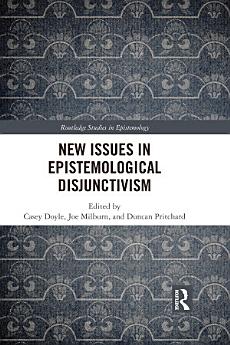New Issues in Epistemological Disjunctivism
Casey Doyle · Joseph Milburn · Duncan Pritchard
abr 2019 · Routledge
Libro electrónico
404
Páginas
family_home
Apto
info
reportLas calificaciones y opiniones no están verificadas. Más información
Acerca de este libro electrónico
This is the first volume dedicated solely to the topic of epistemological disjunctivism. The original essays in this volume, written by leading and up-and-coming scholars on the topic, are divided into three thematic sections. The first set of chapters addresses the historical background of epistemological disjunctivism. It features essays on ancient epistemology, Immanuel Kant, J.L. Austin, Edmund Husserl, and Ludwig Wittgenstein. The second section tackles a number contemporary issues related to epistemological disjunctivism, including its relationship with perceptual disjunctivism, radical skepticism, and reasons for belief. Finally, the third group of essays extends the framework of epistemological disjunctivism to other forms of knowledge, such as testimonial knowledge, knowledge of other minds, and self-knowledge. Epistemological Disjunctivism is a timely collection that engages with an increasingly important topic in philosophy. It will appeal to researches and graduate students working in epistemology, philosophy of mind, and philosophy of perception.
Acerca del autor
Casey Doyle is Junior Research Fellow in Philosophy at St. Hilda’s College, University of Oxford, UK.
Joseph Milburn is a research fellow at the Center for Philosophy of Religion at the University of Notre Dame, USA.
Duncan Pritchard is Professor of Philosophy at the University of Edinburgh, and Director of the Eidyn research centre. His monographs include Epistemic Luck (2005), The Nature and Value of Knowledge (co-authored, 2010), Epistemological Disjunctivism (2012), and Epistemic Angst (2015).
Califica este libro electrónico
Cuéntanos lo que piensas.
Información de lectura
Smartphones y tablets
Instala la app de Google Play Libros para Android y iPad/iPhone. Como se sincroniza de manera automática con tu cuenta, te permite leer en línea o sin conexión en cualquier lugar.
Laptops y computadoras
Para escuchar audiolibros adquiridos en Google Play, usa el navegador web de tu computadora.
Lectores electrónicos y otros dispositivos
Para leer en dispositivos de tinta electrónica, como los lectores de libros electrónicos Kobo, deberás descargar un archivo y transferirlo a tu dispositivo. Sigue las instrucciones detalladas que aparecen en el Centro de ayuda para transferir los archivos a lectores de libros electrónicos compatibles.







